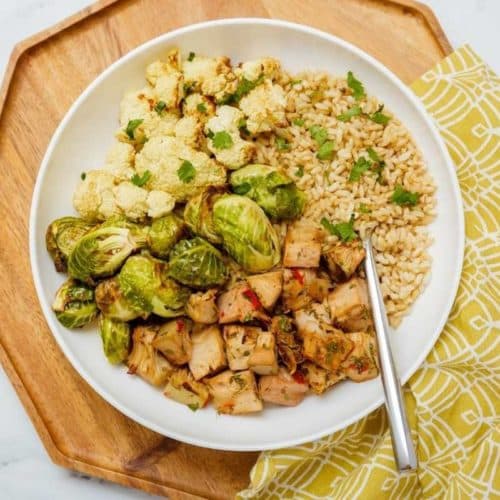This simple recipe is full of flavor, satisfying green light foods, and nutritious vegetables. Marinating the jackfruit gives this dish a Thai flavor which goes well with cauliflower and brussels sprouts.

The Magical Jackfruit
The largest tree fruit in the world, jackfruit can be up to 3 feet long and 20 inches wide. Just one fruit can weigh as much as 110 pounds! However, you're not alone if you haven't heard of it.
Jackfruit is a tropical fruit that is native to south India. It has a distinctive sweet flavor and can be used in a variety of dishes. It belongs to the Moraceae plant family, which also includes fruits like mulberry, breadfruit, and figs. The fruity flavor of jackfruit is very similar to the flavor of a combination of fruits like pineapples, mangoes, apples, and bananas.
Jackfruit is a vitamin and mineral powerhouse. To start, this unique food is a great source of vitamin A, which is known for its contribution to vision health. The vitamin C in jackfruit helps strengthen your immunity to infections and creates protection from free radicals.

Why is Jackfruit a Good Main Ingredient?
Jackfruit is often used as a meat substitute by vegetarians and vegans because of its texture. The flesh or the fruit pods of jackfruit is the part that is most widely consumed. Like tofu, jackfruit takes on the flavor of other foods and spices paired with it.
It can be used in sweet and savory dishes including desserts and curries. Its fibrous texture, similar to that of meat, when cooked with aromatic spices, transforms the humble ingredient into something incredibly delightful. The seeds of jackfruit can also be consumed.
Why is Jackfruit Good for You?
Jackfruit is also rich in a variety of nutrients. The calorie content of jackfruit is quite moderate. 1 serving of jackfruit has approximately 155 calories. A majority of these calories come from the fruit's carb content. Jackfruit is also rich in fiber, protein, vitamin A, vitamin C, riboflavin, potassium, magnesium, copper, and manganese. Moreover, antioxidants in jackfruit are majorly responsible for the health benefits that the fruit provides.
Antioxidants in jackfruit protect cells from oxidative stress and inflammation which is caused by free radicals. Jackfruit is rich in vitamin C which helps in preventing inflammation that can increase your risk of heart disease and cancer. Carotenoids in jackfruit also help in preventing risks of type 2 diabetes and heart diseases. Jackfruit helps in regulating blood pressure and maintaining healthy cholesterol levels.

Buying Tips
You may be able to find jackfruit as a whole fruit, sliced into sections, packed into cans, dried, frozen, or made into other products.
While your average chain grocer (outside of the tropics) may not sell jackfruit fresh, demand is rising fast and many stores are starting to sell it. Fresh jackfruit is easiest to find when it’s in season during the summer months, but you can find canned jackfruit in most grocery stores year-round.
When buying jackfruit, first check its skin color. Jackfruit that has yellowish green skin and some brown patches is ripe, as opposed to the less ripe ones which have dark green skin. The ripe ones give out a strong fragrance. When you tap them with your fingers, they sound kind of hollow. If you don’t plan to cut open the jackfruit immediately, choose a dark green one. Keep it at room temperature and allow it to ripen naturally.
How to Prepare It
Jackfruit isn't easy to peel because of its sticky sap. To keep it from gumming up your knife and hands, rub them with cooking oil before you slice open your fruit (this is pretty much the only way we’ll advise you to use oil in your kitchen!). Once you do, it will take time to separate the fleshy bulbs, which you can eat, from the tough strips of the membrane, which you can't. You'll then have to remove the seeds from each bulb.
Once a jackfruit is ripe, it will turn brown and go bad quickly. To keep yours fresh, store it in the refrigerator. When kept cool and dry, a ripe jackfruit can last up to 6 weeks.
If you don't want to prepare your own jackfruit, look for canned or ready-to-eat jackfruit at the store. Make sure to find canned jackfruit with no added sweeteners or sodium. Some people use these as one of many potential meat substitutes and alternatives.


Thai Jackfruit with Rice
Ingredients
- 2 cups fresh jackfruit - cut into 1/2" cubes
- 2 tbsp fresh parsley - chopped
- 1 lime - juice
- 1 tbsp white wine vinegar
- 1 tbsp maple syrup
- 1 tsp low-sodium soy sauce
- 1 tbsp ginger - minced
- 1 clove garlic - minced
- 1 Thai chili pepper - deseeded and finely chopped
- 2 cups cauliflower - cut into pieces
- 2 cups brussels sprouts - cut in half
- 2 cups brown rice - cooked
- 2 tbsp fresh cilantro - chopped
Instructions
- In a bowl mix the parsley, lime juice, white wine vinegar, maple syrup, soy sodium, minced ginger, garlic and chili pepper.
- Add the prepared jackfruit pieces to the bowl and marinade for 30 minutes or longer.
- In the meantime, prepare the cauliflower and brussels sprouts.
- Preheat the oven to Bake at 350°F.
- In a casserole dish, place the prepared vegetables. Add the marinated jackfruit and juices and mix
- Cook for 20 to 30 minutes or until vegetables have softened.
- Serve the jackfruit mixture on a bed of cooked brown rice and top with cilantro.

